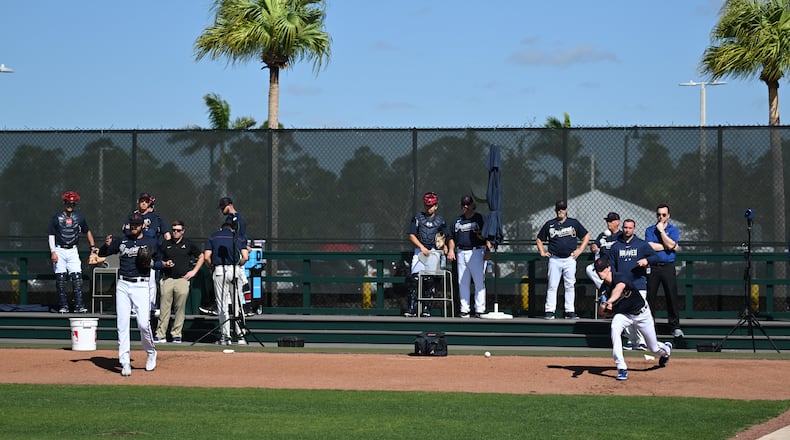FORT MYERS, Fla. — In spring training, we are told to focus less on results and more on context. Pitchers are experimenting. Hitters are finding their timing. The in-game statistics often can be meaningless.
There are exceptions.
What if you’re a pitcher fighting for the fifth rotation spot after struggling last year? Do they matter more?
“Yeah, I think so,” said Ian Anderson, who is in the competition for that spot. “I’ve never been good in spring training, but this year it means more to me to put up better numbers. I mean, that’s how you make the team, you put up good numbers.”
That’s part of why Anderson felt so frustrated after Tuesday’s Grapefruit League debut. After last season, he felt so motivated to take what he learned, adjust and come back better than ever. He arrived to camp excited about the future after his productive offseason.
Then on Tuesday versus the Twins, in an eventual 10-7 loss for the Braves, Anderson allowed two home runs in his first inning. He didn’t complete that frame – instead, manager Brian Snitker used the unique spring training re-entry rule to pull Anderson before the first inning ended and re-insert him into the game in the second.
Yes, it’s only spring training, but this isn’t how Anderson and the Braves hoped this would go. The righty didn’t offer any excuses after allowing four runs on three hits – two of them home runs – over 1-1/3 total innings. He also issued three walks and only struck out one batter.
“I’m not gonna sugarcoat it. It was not very good,” he said after his performance. “You put in all the work to turn the corner in the offseason; that’s not the first performance I wanted to put out there. But I guess if you’re gonna get punched, you might as well get punched pretty hard, see how you come back.”
Anderson is among the pitchers fighting for the fifth spot in the starting rotation. One of his competitors, Bryce Elder, didn’t pitch well in his spring debut, either. Michael Soroka, who is competing for that job, came into camp dealing with a left hamstring ailment.
In the first inning, Minnesota’s Edouard Julien took a 93 mph fastball – Anderson’s second pitch of the game – and hit it 411 feet. It left the bat at 106 mph, per Statcast. In that same inning, Anderson issued a pair of two-out walks, which set up the second blast.
Anderson hung a slider – his new pitch – to Willi Castro, who put it over the fence. “That’s the one pitch that I obviously want back,” Anderson said of the ball that went right down the middle of the plate. He worked on this pitch over the offseason, planning to debut it this spring.
“(Pitching coach Rick Kranitz) said he’s seen it: People have a new pitch, they want to force it in there a little bit,” Anderson said. “That’s kind of what happened (on the home run).”
But spring training is for imperfection. The Braves don’t expect Anderson to be his best Feb. 28.
“I don’t expect it to be a polished thing right now because he’s trying some different things – pitches, delivery, the whole thing, so we gotta give him a chance in game conditions to kind of get everything under control,” Snitker said.
On Tuesday, Anderson’s fastball averaged 91.9 mph, down from the 94 mph it averaged last season. But this should tick up as spring progresses and he throws more. Anderson estimated he threw five or six sliders.
In the second inning, when Snitker inserted him back into the game, Anderson got two quick outs before walking a batter, ending his afternoon. Of 45 pitches, 21 were strikes.
“I felt better in the second inning even, just kind of getting my sights back, I think,” he said. “And I think I wanted to go out there and just show them all the work I put in so bad, and things just kind of sped up on me. Obviously not how I envisioned it starting, but we’ll see how the Sunday goes. I think it’d be a lot better.”
“Sure, we want him to get results, but we understand where we’re at right now, and he’s gonna have a lot of time to do that,” Snitker said.
Sunday will be the next time he pitches. It’ll be a chance to bounce back. He’ll attempt to use this outing to improve the next one.
“Overall, I just have to be better, be in the (strike) zone more, be on the attack more and kind of force the issue more,” Anderson said.
Many times in spring training, results don’t matter. Spring games can be random. Everyone simply is preparing for the season and trying to round into form before opening day March 30. An example: Anderson said he’s never had good spring numbers.
This time, the results might be important for Anderson, who’s trying to prove he should be in the rotation come opening day.
Over the offseason, he made multiple changes. He thinks they can help him now.
“I think it’s gonna help me rebound from games like this a little bit quicker,” Anderson said. “It’s the work that I put in and the trust that I’ve gained and the confidence I’ve built from the process of all the work that I’ve been trying to put in. That should hopefully make the bad ones not linger into the next one.”
About the Author
Keep Reading
The Latest
Featured


